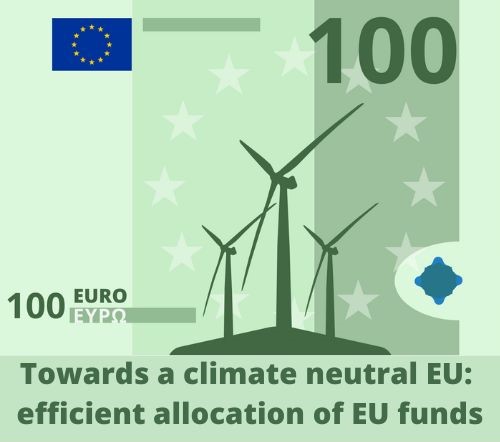Introduction
The EU’s transition to climate neutrality committed to in the European Green Deal (EGD), will require a major change in public funding and incentives. Most National Recovery and Resilience Plans (NRRPs) are already adopted by now (November 2021) and the Partnership Agreements and Operational Programmes are under discussion.
However, as it has been experienced in the past, these documents in themselves do not always guarantee the best use of EU money for the environment and climate.
The aim of the project is to contribute to support the efficient use of EU money in the participating countries, highlight best practices and lessons learnt, and widely disseminate these observations both nationally and internationally. Thus, the project will help to improve the level and quality of EU funding and fiscal policy for EU climate action and EGD delivery by focusing on the game-changing actions at the national level.
At the same time, it will provide valuable inputs for efficient use of EU funds regarding climate protection also on the EU level.
Check out our project website for more information.
Goals and Objective
Long-term: Contributing to making finance flows consistent with a pathway towards low GHG and climate-resilient development, as stated in the Paris Agreement.
Short term: Improve the level and quality of funding and fiscal policy for EU climate action and EGD delivery by focusing on the game-changing actions at the national level, providing valuable inputs for better use of EU money also on EU level, and raising the awareness of civil society.
Impact: In our expectation, EU funding will provide more targeted and effective support for climate and environment action, while incentives and funding for programmes and projects which are incompatible with the European Green Deal will be reduced. This will help to catalyse faster decarbonisation of the EU economy and boost climate mitigation in all sectors. The best practices identified during the project will be very useful to all EU countries. The level and quality of spending from European structural and investment funds and the Recovery and Resilience Facility will be improved in the involved countries, with likely impacts in further countries thanks to international networking and capacity building beyond the project team.
Activities
- Empowering civil society to engage in assessing programmes and projects and to propose recommendations for their implementation
- Transferring knowledge about the current situation on the national level, and preparing assessments
- Preparing policy recommendations and disseminating best practices examples for climate-related policy reforms through direct communication to target groups
- Communication campaign to raise awareness of all stakeholders
Overall information



